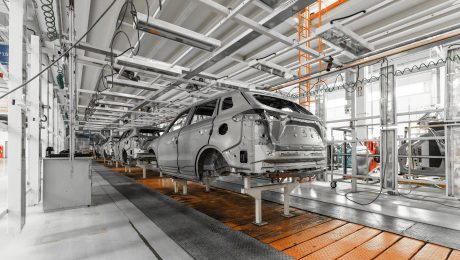A Proactive Guide to Navigating Shipping Delays and Exceptions in Your Supply Chain
For a customer, the words “shipping delays” can lead to frustration, disappointment, and potentially, a lack of trust in a company.
A delay in receiving goods from a business or supplier can cause a ripple effect in the supply chain. It not only affects the customer but also other areas of the supply chain. But having a well-managed system in place can help prevent, or at least reduce, some of the challenges businesses face with delayed shipping of goods and services. Keep reading!
Common Causes of Shipping Delays
Shipping exceptions are a common occurrence in various industries, including retail, automotive, manufacturing, and commercial services. Oftentimes, these delays can be addressed and/or prevented with proper contingency planning. There are, however, times when businesses are at a standstill and at the mercy of supply chain disruptions. Here are some common causes of shipping delays and exceptions:
Weather-Related Disruptions
Mother Nature is often responsible for many shipping delays, particularly in North America and Europe. Variable weather conditions and natural disasters can halt a shipment of supplies or goods for days or weeks at a time. This is especially common with land deliveries and overseas transportation, even if a business has multiple fulfillment centres across the globe.
Transportation and Logistics Issues
Shipping delays can be directly and indirectly linked to transportation and logistics issues along the supply chain. With rising fuel prices, worker shortages, and an increase in online sales, transportation delays are at an all-time high. Labour-related issues are associated with low pay offerings, sick days, and strikes.
Customs and Regulatory Hurdles
International shipping has been a challenge for many businesses even before the recent global transporting issues. With tougher restrictions, rules, and regulations put in place at most borders around the world, customs clearance for shipments involves long delays.
Supplier and Manufacturing Delays
Supply chain disruptions from the suppliers and/or manufacturers can gravely impact the delivery times as scheduled. In recent years, these disruptions have been linked to conflicts among countries, shipping ports, and, of course, the global pandemic. With a worldwide labour shortage, economists predict supply chains will continue to have interruptions for years to come.
The Impact of Shipping Delays and Exceptions on the Supply Chain
The enormous impact delays and exceptions have on the supply chain cannot be properly measured. On the surface, these disruptions appear to only affect customer service and customer expectations, but behind the scenes, the effect is more profound.
Financial Implications
Financially, shipping delays can cripple a business, particularly if it becomes a reoccurrence within the supply chain. With every delayed shipment, a business can face increased costs in storage and inventory, penalties, returns, administration fees, and expedited shipping. In addition, a loss of revenue from poor customer experiences due to shipping delays can be significant for a business.
Customer Satisfaction and Loyalty
Delays within the supply chain can hurt the customer experience. Shipping delays are the number one complaint from customers who use e-commerce sites. In fact, customers these days expect their products delivered within days, if not hours. Dissatisfied customers may choose to take their business elsewhere, which opens the door for competitors to swoop in and acquire those customers instead.
Reputational Risks
A brand depends on its reputation to continue to survive in a competitive industry. Shipping delays can cause customers to lose trust in a brand, therefore affecting their support and promotion of a brand. By using social media platforms to voice their concerns, customers can create a negative public perception of a brand, which could affect their various partnerships in the business world.
Proactive Strategies to Mitigate Shipping Delays
In an ideal world, there would not be any shipping delays or exceptions along the entire supply chain. But, unfortunately, it’s a reality. To create a near-perfect logistics system, here are some strategies businesses can adopt to mitigate shipping delays:
Diversify Suppliers and Logistics Partners
Effective planning begins with building a resilient network of suppliers and logistic partners. Keeping updated on changing local regulations within the suppliers’ regions can prevent delays along the supply chain, particularly in the delivery sectors. Also, it’s important to work with multiple carriers for customer deliveries since ground, air, and door-to-door options may not be possible in some destinations.
Implement a Contingency Plan
To be successful, shipping departments must have a contingency plan for extreme weather, transportation issues, and other unforeseen incidents. Monitoring deliveries and weather conditions can help businesses create a contingency plan if certain patterns are observed often. This can include developing alternative delivery routes and shipping options. This contingency plan may also involve stockpiling certain items during peak seasons.
Strengthen Communication Channels
As customer satisfaction is one of the most important goals in the business world, having clear communication channels within the supply chain is crucial. Suppliers, carriers, and customers must have access to transparency and open communication to address any potential or existing shipping delays. By having direct interaction, businesses can be prepared with alternatives if deemed necessary to shorten delivery delays.
Invest in Technology
“Successful investing is about managing risk, not avoiding it”. This quote rings true in the e-commerce world when it comes to investing in technology to improve shipping. Real-time inventory software allows all parties involved to be informed via notifications about delivery statuses and/or delays. Technology enhances the customer experience while allowing businesses to monitor shipping through data analytics to identify potential problems.
Be Proactive in Shipping Management with Lean Supply Solutions
Protect your business’s reputation and financial future with Lean Supply Solutions’ supply chain optimization and logistics management services. We offer manufacturing support, consulting, project management, product and order fulfillment, and warehouse and distribution services customized to your needs. Contact us today to get a free quote on how we can help you navigate shipping delays and exceptions in your supply chain.
- Published in Blog
The Future of Inbound Automotive Logistics: Trends and Innovations
The automotive industry is constantly evolving, and so is the logistics involved in getting cars from the manufacturer to dealerships or customers. The future of inbound automotive logistics is all about technology and innovation. From artificial intelligence (AI) to blockchain technology for secure transactions, the industry is exploring new ways to streamline the supply chain and reduce costs. This blog post examines some automotive logistics trends and breakthroughs shaping the supply chain.
Trends That Are Shaping the Future of Inbound Automotive Logistics
As the demand for electric vehicles grows, logistics companies also need to adapt to the specific requirements of these vehicles. The future of inbound automotive logistics is exciting, and innovation is key to staying ahead in a rapidly changing industry.
Integration of Advanced Technologies
Advancements in technology are revolutionizing every sphere of business—and inbound automotive logistics is no exception. The integration of artificial intelligence (AI), the Internet of Things (IoT), and automation is pivotal in providing real-time visibility into the supply chain.
Automation in warehouses, from robotic forklifts to automated sorting systems, ensures that inbound processes are more efficient, accurate, and safer. Sensors placed on products, pallets, or vehicles transmit continuous data streams, enabling logistics professionals to track and monitor the status of shipments and inventory levels. Meanwhile, by leveraging AI algorithms, logistics companies can forecast demand, predict optimal stock levels, and route deliveries.
Related: The Role of Demand Management in Supply Chain Optimization
Shift Towards Electric Vehicles
The global shift towards electric vehicles (EVs) has begun. In Canada, all passenger vehicles, including cars, SUVs, crossovers, and light trucks must be hydrogen-powered, electric, or hybrid by the year 2035.
That said, electric vehicle (EV) production demands new parts and battery management systems. However, the handling, storage, and transportation of these components require specialized procedures, which inbound logistics must adapt to. The sourcing and transportation of lithium for batteries, for example, present both challenges and opportunities for logistics companies. The procurement of these materials often requires establishing new supplier relationships and routes, while also grappling with safety and environmental regulations.
Industry 4.0 and Automation
Automation is a cornerstone of Industry 4.0 within the automotive industry. Robotics, automatic assembly systems, and simulation testing operations provide faster and more efficient delivery within the plant, warehouse, and along the transportation system.
But beyond assembly lines, automated solutions can significantly optimize warehouse and transportation operations, leading to considerable speed, accuracy, and cost reduction. They can streamline complex logistics scenarios, adapt to changes on the fly, and minimize the potential for human error.
Sustainable Practices
The push for sustainability permeates every aspect of automotive logistics. With governments demanding that auto manufacturers reduce their carbon footprint and focus on safe, sustainable practices, companies must adopt sustainable practices such as eco-friendly packaging materials and fuel-efficient transportation modes.
Advancements in bio-based packaging options and alternative fuels are playing a significant role in reducing the carbon footprint of logistics activities.
Data-Driven Decision Making
Automotive logistics is no stranger to using real-time data analytics to streamline operations. Real-time data analytics enables companies to refine transportation routes, manage inventories proactively, and predict maintenance cycles, leading to smoother and more cost-effective logistics operations.
In addition, machine learning algorithms can predict machinery wear and tear, weather conditions, traffic patterns, and other related challenges, helping to keep equipment and vehicles in optimal condition. Route optimization not only reduces fuel consumption but also ensures timely deliveries.
Collaboration and Ecosystem Integration
Across the automotive industry, more stakeholders are collaborating to open new markets and enhance the development of newer technology. The parties involved are expanding to include leading technology strategists, tech companies, and big-money investors to provide safer and more efficient transportation options.
Integrating data across platforms enhances communication and efficiency. It provides a unified view of the supply chain, enabling stakeholders to respond quickly to shifts in demand or supply chain disruptions.
Key Innovations to Watch
In the realm of automotive logistics, several technologies stand out for their potential to disrupt the traditional ways of operating.
Autonomous Vehicles for Delivery
With drones and self-driving vehicles becoming a common sight in many districts, the use of autonomous delivery vehicles and technology is increasing. This technology is being used for “last-mile delivery” wherein a product is in the final steps of the journey to the consumer. These technologies, however, must contend with evolving regulations and safety standards.
Blockchain for Transparency and Traceability
Blockchain technology has been marked as a reliable source of transparency and traceability within the supply chain system. Using the precision of real-time data, this technology allows for cost-saving measures through sustainable practices. In addition to better data management, it also leads to faster order processing without having a surplus of inventory as every sector of the supply chain has the same real-time information.
3D Printing of Parts
Using 3D printing for on demand production of spare parts has been a game-changer for many manufacturing companies in the automotive field. Using advanced equipment and producing 3D spare parts can help lower costs, reduce stockouts and overstocks, and boost customer satisfaction. With the use of this technology, manufacturers can shorten lead times and the need to readjust machinery for design changes.
Hyperloop Technology for High-Speed Transportation
Though still in conceptual stages, hyperloop technology was first introduced in 2013 as a mega high-speed transportation method. Hyperloop technology could revolutionize high-speed transportation of goods, significantly reducing transit times and potentially altering global supply chain dynamics.
Learn More About Lean Supply Solutions’ Expertise in Innovative Logistics Solutions
Inbound automotive logistics is poised for a transformation, propelled by technological innovation and the necessity for greater sustainability. At Lean Supply Solutions, integrated customized logistics solutions are a priority. As a leading provider of global supply chain management, we offer lean processes, leading-edge IT systems, and world-class systems to all of our clientele.
Contact us to learn how our innovative logistic solutions can better manage your business with cost-saving measures.
- Published in Blog



